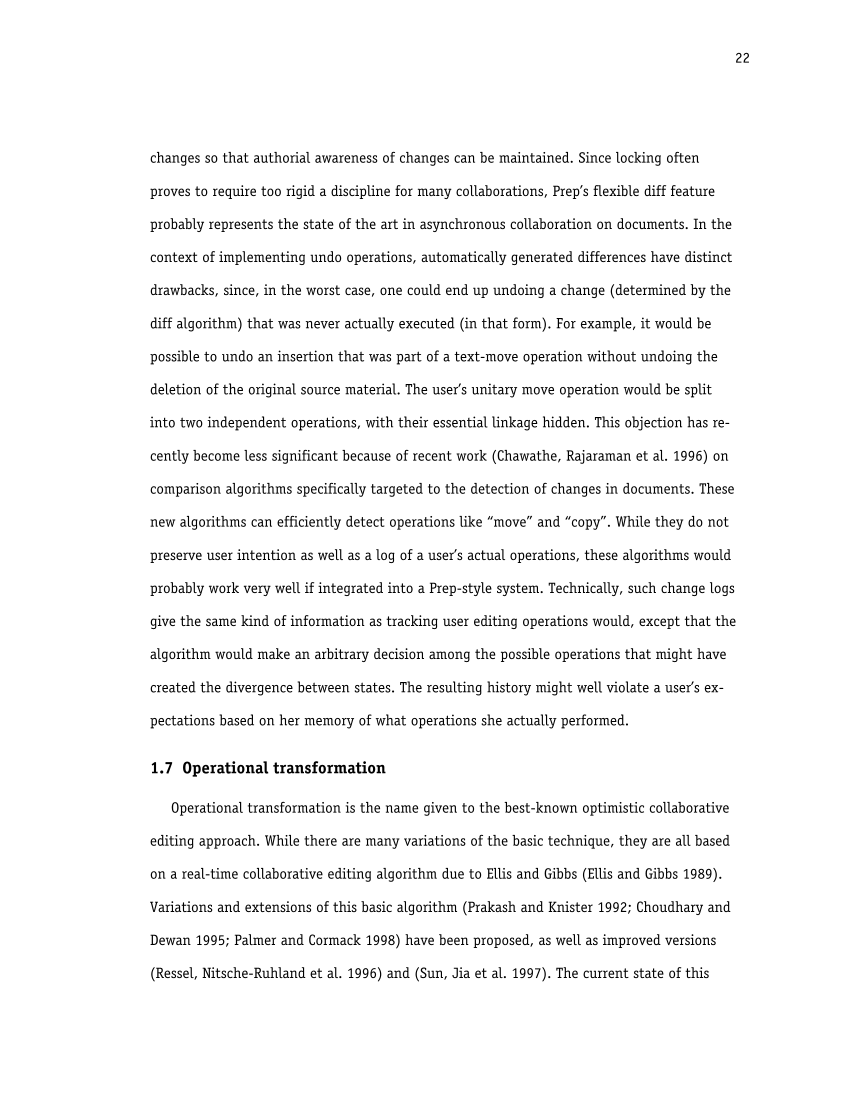22
changes�so�that�authorial�awareness�of�changes�can�be�maintained.�Since�locking�often
proves�to�require�too�rigid�a�discipline�for�many�collaborations,�Prep’s�flexible�diff�feature
probably�represents�the�state�of�the�art�in�asynchronous�collaboration�on�documents.�In�the
context�of�implementing�undo�operations,�automatically�generated�differences�have�distinct
drawbacks,�since,�in�the�worst�case,�one�could�end�up�undoing�a�change�(determined�by�the
diff�algorithm)�that�was�never�actually�executed�(in�that�form).�For�example,�it�would�be
possible�to�undo�an�insertion�that�was�part�of�a�text-move�operation�without�undoing�the
deletion�of�the�original�source�material.�The�user’s�unitary�move�operation�would�be�split
into�two�independent�operations,�with�their�essential�linkage�hidden.�This�objection�has�re-
cently�become�less�significant�because�of�recent�work�(Chawathe,�Rajaraman�et�al.�1996)on
comparison�algorithms�specifically�targeted�to�the�detection�of�changes�in�documents.�These
new�algorithms�can�efficiently�detect�operations�like�“move”�and�“copy”.�While�they�do�not
preserve�user�intention�as�well�as�a�log�of�a�user’s�actual�operations,�these�algorithms�would
probably�work�very�well�if�integrated�into�a�Prep-style�system.�Technically,�such�change�logs
give�the�same�kind�of�information�as�tracking�user�editing�operations�would,�except�that�the
algorithm�would�make�an�arbitrary�decision�among�the�possible�operations�that�might�have
created�the�divergence�between�states.�The�resulting�history�might�well�violate�a�user’s�ex-
pectations�based�on�her�memory�of�what�operations�she�actually�performed.
1.7 Operational�transformation
Operational�transformation�is�the�name�given�to�the�best-known�optimistic�collaborative
editing�approach.�While�there�are�many�variations�of�the�basic�technique,�they�are�all�based
on�a�real-time�collaborative�editing�algorithm�due�to�Ellis�and�Gibbs�(Ellis�and�Gibbs�1989).
Variations�and�extensions�of�this�basic�algorithm�(Prakash�and�Knister�1992;�Choudhary�and
Dewan�1995;�Palmer�and�Cormack�1998)have�been�proposed,�as�well�as�improved�versions
(Ressel,�Nitsche-Ruhland�et�al.�1996)and�(Sun,�Jia�et�al.�1997).�The�current�state�of�this
changes�so�that�authorial�awareness�of�changes�can�be�maintained.�Since�locking�often
proves�to�require�too�rigid�a�discipline�for�many�collaborations,�Prep’s�flexible�diff�feature
probably�represents�the�state�of�the�art�in�asynchronous�collaboration�on�documents.�In�the
context�of�implementing�undo�operations,�automatically�generated�differences�have�distinct
drawbacks,�since,�in�the�worst�case,�one�could�end�up�undoing�a�change�(determined�by�the
diff�algorithm)�that�was�never�actually�executed�(in�that�form).�For�example,�it�would�be
possible�to�undo�an�insertion�that�was�part�of�a�text-move�operation�without�undoing�the
deletion�of�the�original�source�material.�The�user’s�unitary�move�operation�would�be�split
into�two�independent�operations,�with�their�essential�linkage�hidden.�This�objection�has�re-
cently�become�less�significant�because�of�recent�work�(Chawathe,�Rajaraman�et�al.�1996)on
comparison�algorithms�specifically�targeted�to�the�detection�of�changes�in�documents.�These
new�algorithms�can�efficiently�detect�operations�like�“move”�and�“copy”.�While�they�do�not
preserve�user�intention�as�well�as�a�log�of�a�user’s�actual�operations,�these�algorithms�would
probably�work�very�well�if�integrated�into�a�Prep-style�system.�Technically,�such�change�logs
give�the�same�kind�of�information�as�tracking�user�editing�operations�would,�except�that�the
algorithm�would�make�an�arbitrary�decision�among�the�possible�operations�that�might�have
created�the�divergence�between�states.�The�resulting�history�might�well�violate�a�user’s�ex-
pectations�based�on�her�memory�of�what�operations�she�actually�performed.
1.7 Operational�transformation
Operational�transformation�is�the�name�given�to�the�best-known�optimistic�collaborative
editing�approach.�While�there�are�many�variations�of�the�basic�technique,�they�are�all�based
on�a�real-time�collaborative�editing�algorithm�due�to�Ellis�and�Gibbs�(Ellis�and�Gibbs�1989).
Variations�and�extensions�of�this�basic�algorithm�(Prakash�and�Knister�1992;�Choudhary�and
Dewan�1995;�Palmer�and�Cormack�1998)have�been�proposed,�as�well�as�improved�versions
(Ressel,�Nitsche-Ruhland�et�al.�1996)and�(Sun,�Jia�et�al.�1997).�The�current�state�of�this





























































































































































































